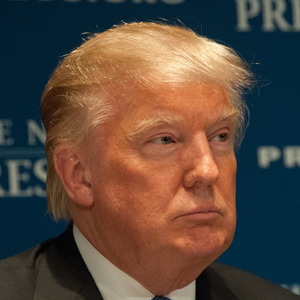Trump signs an executive order to end family separations; ABA applauds 'first step'

President Donald Trump/Albert H. Teich (Shutterstock.com).
Updated: President Donald Trump has signed an executive order to end the separations of immigrant families at the border.
Trump signed the order Wednesday afternoon, report CBS News and a tweet by the Associated Press.
The order says it is the policy of the administration to “rigorously enforce” immigration laws, and it is also administration policy to to maintain family unity.
The order says the Department of Homeland Security should house immigrant families while criminal or immigration proceedings are pending, “to the extent permitted by law and subject to the availability of appropriations.”
The order says the Defense Department should provide available housing for immigrant families and should construct such facilities “if necessary and consistent with law.” The order also directs the heads of all executive departments and agencies to make appropriate facilities available to house the immigrants.
The order also directs Attorney General Jeff Sessions to ask a federal court to modify a 1997 consent decree to allow DHS to detain the immigrant families together the entire time that criminal or immigration proceedings are pending. The consent decree, and a subsequent federal appellate decision interpreting it, require immigrant children to be released or transferred to a licensed facility within a reasonable period, set presumptively at 20 days.
Families were being separated because the parents were being transferred to federal criminal custody pending a court hearing for illegal entry, which is a misdemeanor for a first-time offense. The Trump administration had instituted the prosecutions as part of its zero-tolerance policy.
ABA President Hilarie Bass applauded the president’s decision to sign the order and called on the government to quickly reunite families. “The ABA pledges its full support in working within the legal community to make this happen,” Bass said in a statement.
Bass called the executive order “a first step” and said comprehensive and just immigration reform is still needed. The ABA opposes detention of noncitizens except in extraordinary circumstances and favors the least restrictive alternative to ensure appearance in immigration proceedings, she said. Families should not be detained, she said, absent an individualized determination of flight or security risk.
If families are detained, visits should be allowed by independent observers, friends and families, Bass said. Detainees should also receive legal information explaining the process and rights.
The ABA also supports government-funded counsel to represent indigent people in removal proceedings.
Bass is directing lawyers who want to volunteer to this resource page.
News about the executive order developed throughout the day.
The first reports, which relied on anonymous sources, said DHS Secretary Kirstjen Nielsen was drafting the executive order, in consultation with White House lawyers. The Associated Press broke the news. More news coverage followed, including stories by the New York Times and Politico.
Nielsen has previously said there is no policy to separate families, but it is required by the federal court decisions. Parents were separated from their children and transferred to criminal custody for prosecution for illegal entry.
White House aides told the Times that Trump was aware his actions could lead to court battles over alleged violations of the consent decree.
The American Civil Liberties Union had previously filed a suit seeking to prevent family separations. ACLU executive director Anthony Romero indicated the organization wasn’t satisfied with Trump’s plans.
“This executive order would replace one crisis for another,” Romero said in a statement before details of the order were made public. “Children don’t belong in jail at all, even with their parents, under any set of circumstances. If the president thinks placing families in jail indefinitely is what people have been asking for, he is grossly mistaken.”
Story updated at 1:10 p.m. to include more information on possible lawsuits and the ACLU statement; updated at 2:20 p.m. to report that Trump has signed the order; updated at 3 p.m. to report on directives in the order. Story updated at 4:40 p.m. to include the ABA statement.



